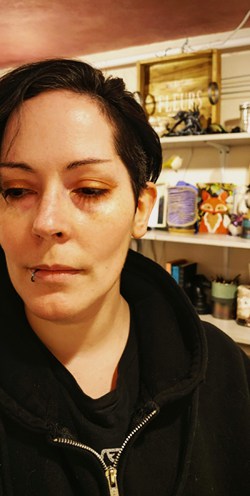AI Art book covers, Capitalism, Elitism and Inequality Justified through Meritocracy in Self Publishing
So the AI art fear mongering continues the war drums on the poor, and I thought it might be time to actually talk about my opinions on this as I try to collect my brain back into something that can return to writing without being a neurotic mess. So, of course, I’m going to pick the stance that pisses everybody off, cuz who would I be otherwise?
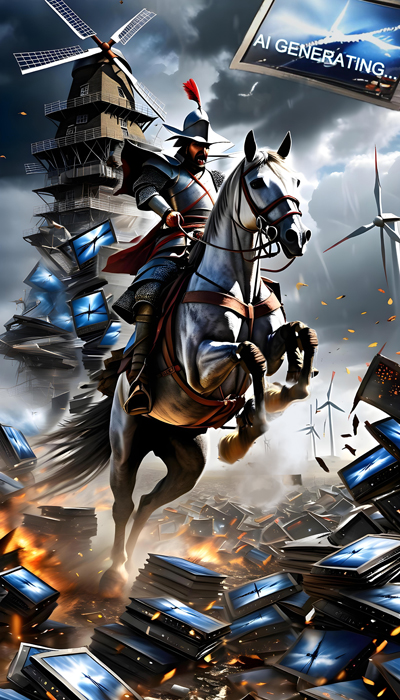 A little background. I taught myself digital art when I got Painter back when living in my adoptive parents’ moldy basement as a teen. While the black mold ate away at my immune system and I thought I was going crazy with my brain burning, I made art every day, figuring out each new tech advance I could afford, while taking care of my mom who was dying of cancer and later my dad with dementia. As an adult, I couldn’t art. I had to work and make a steady income. I was disabled, and my neurosis in regards to digital art was really bad. I would spend 60 hours barely sleeping, making highly realistic fantasy characters, and I was always grumpy from it. I didn’t realize at the time, but it was impacting my eyesight, and the more eyestrain, the more it impacted my mood. When I got sick in my 30’s from a mysterious illness that turned out to be MCAS triggered by mold exposure and Lyme Disease, I was bedbound a lot. I used the time to start a self publishing business, writing something not fanfics for the first time, and learning what it took to make book covers for my genre.
A little background. I taught myself digital art when I got Painter back when living in my adoptive parents’ moldy basement as a teen. While the black mold ate away at my immune system and I thought I was going crazy with my brain burning, I made art every day, figuring out each new tech advance I could afford, while taking care of my mom who was dying of cancer and later my dad with dementia. As an adult, I couldn’t art. I had to work and make a steady income. I was disabled, and my neurosis in regards to digital art was really bad. I would spend 60 hours barely sleeping, making highly realistic fantasy characters, and I was always grumpy from it. I didn’t realize at the time, but it was impacting my eyesight, and the more eyestrain, the more it impacted my mood. When I got sick in my 30’s from a mysterious illness that turned out to be MCAS triggered by mold exposure and Lyme Disease, I was bedbound a lot. I used the time to start a self publishing business, writing something not fanfics for the first time, and learning what it took to make book covers for my genre.
About 9-10 years in, my eyesight started failing. The computer screen and my inability to realize I wasn’t blinking enough when working (it’s some sort of hyperfocus mode in my autistic brain) was causing damage, along with inflammation from the untreated MCAS. When my eyesight started failing, I thought that was it. I’d never be able to make another cover for my books again. I’d have to hire out — and as someone who has been disabled for nearly 20 years now, with my disability income being poverty — that is then immediately put into rent, and only rent — I knew it was impossible. I would never be able to put out another book again with a nice cover. I’d never be able to compete in the marketplace. I had lost momentum as a writer because the sickness was taking out my executive functioning, and I hadn’t been able to publish or even check in regularly. The algorithm would ignore me — as it should, because this is how the algorithm on Amazon works. I won’t pretend we live in a bubble: those who cannot afford the means to better themselves will never gain access to increasing their income. This is a reality for many. We don’t live in a utopia of equality and safety nets; people die from poverty every day.
You know what’s not a reality? Artists suddenly incapable of making new art now that AI art exists. Fears that jobs — contracted, promised jobs — are suddenly disappearing because AI art exists. Is an artist owed a job? I was an artist for years, and I had skills I built up, skills that fucked my eyes up from working with computer screens. I broke myself being an artist, and you know what? I was never rich from it. I was never promised stability. I didn’t become an artist because I was looking at a stable career; I became an artist because I loved to create art and I was ill, and I had a ton of time on my hands with few prospects. That’s the same reason I became a writer — not for the money. I had no skills as a writer. I was learning as I went, hoping I might one day make money. I did, eventually, but it was completely determined by my ability to produce work — being sick meant no income. No means to live beyond a supplemented income that is never enough to pay rent in my area (rent has doubled here just the last couple years and my income has absolutely not).
Artists aren’t all paid well. It is not a career anyone goes into assuming they are going to be financially set. I’m getting back into traditional art because it’s the easiest on my eyes, and I’m not thinking I’m going to “strike it rich”. Artists aren’t paid their time, and the ones who are — who fought to get there, or were lucky to be dropped in a situation where it was just automatic — doesn’t mean they were ever owed it. Because we’ve been around. We’ve been competing within a global market for years, which has brought prices down. Competing with hobbyists who just do it for fun and hey, throw a couple $10s their way. Fiver used to be $5. It was a race to the bottom. But does that mean those in other countries with a different economic system are immoral? Bad because they need to make a living too? No, that would be nonsense. It means our economic system is broken, and the people within it — merely trying to survive — don’t want to die from poverty while working their asses off and only making poverty.
Surviving Capitalism
So let’s talk about survival of the fittest in what is supposedly an empathetic species called humanity. It’s not a match, is it? If you claim to give a fuck about others, why are you only supporting some? Didn’t you realize it’s not just artists starving? Didn’t you realize that these individuals being blamed aren’t the ones that created this problem, but are just living in the shit trying to get out? (What, using AI art kills puppies every time? Are you sure, or are you just exaggerating out of some internal fear of change?)
Capitalism is about survival of the fittest, while giving the wealthy the means to survive and gain more wealth, and ensuring the poor don’t have access to those means so they don’t survive. (It’s money. Money is the means to survive in a capitalistic society for those who have the privilege of not understanding that.) Poverty is a promise of everything always being harder until you either 1) manage to overcome poverty, something extremely rare no matter how many Cinderella stories they force feed us. Or 2) die, but not before passing on that poverty. Because it’s generational. Wealth inequality is generational inequality. That means money goes to the kids, and so does debt. That means when you can’t break out of poverty for your family, you’re leaving them in poverty for their family to come. And that is emotionally crippling to work so hard and not be able to lift your kids out of this mess. It’s why parents invest in the horrendously overpriced cost of education, just in case it might work. But it’s just debt, and doesn’t overcome classism.
This is not a failure of individuals, no matter what everyone loves to insist. It is a design of the system of inequality. It is a promise from a government that enforces inequality. Have you ever tried to get on services for poverty in the US? It’s near impossible. They make it so convoluted, with automatic denials at every turn, to keep people from getting help. So they can claim less people are suffering, but instead it’s just a dead bureaucracy ignoring the cries of the poor. That’s a government not afraid of its people, because its people are too busy blaming the poor instead of demanding change. Parts of my country are considered 3rd world conditions, while the US touts it’s amazing wealth and “access” to healthcare no one can afford, etc. You have programmers living in tent cities, while the government claims everything is fine. It’s fine for the wealthy. They’re not living in tent cities (but charging rent that prevents others from having affordable homes).
But this is a Meritocracy!
Did you think you were living in a meritocracy? That’s the big lie they love to sell people. Inequality isn’t “real”, it’s nature based economics because some people have skills “deserving” of high pay, while others don’t. And hey, some artists, they “deserve” the big bucks. They “deserve” to not have competition. Some fuckwit sold a banana on a wall? They “deserved” it, were “owed” it because they were smart enough to play the game the “right” way. They were smart enough, so their merit was rewarded. Those CEOs are “skilled” enough, so their merit is rewarded. Retail workers? They don’t “deserve” a living wage cuz they didn’t pay for their knowledge. They just have skills that we don’t need, right? That’s why shopping is so great without anyone working in the store. Sure sure.
They might as well be calling everyone not making a living wage a whore, huh, cuz those must be everyday skills not valued by society. And hey, it’s much easier to jail people who don’t make a living wage — prisons make more money off the jailing of the poor than the working poor make working.
So how do these high earners know they’re so smart? They could afford to go to the most prestigious of colleges. Those colleges taught them the magic of networking with others in high society, keeping the ranks tight, reinforcing social inequality that reinforces wealth inequality. Hey, Academia decides what intelligence is; they must only let the smartest in. The cost of entry has nothing to do with it. What, a few poors could get in to those colleges? Don’t worry, they’re the tokens so we can claim the system isn’t unequal. They won the lottery of inequality, so classism totally doesn’t exist. They were just “skilled” enough, so they get the elevator up into places with limited spots. It’s their “merit”, right? Merit with limits that only a few are allowed through — that’s what merit is, right? Removing competition by raising people up to a different level and giving them all the things they refuse to give everyone not on that level… Don’t think that’s merit.
Every business book or productivity book wants to tell us if we just have more skills, we can sell our labor for more. Just be the best machine. Don’t get sick, don’t get old, don’t get tired, don’t be filled with existential dread, don’t care about the environmental and social consequences of your actions as you try to dig out of poverty. Hustle. Get more side gigs. Otherwise it’s YOUR fault inequality exists. You, the individual, just wasn’t good enough, and that’s why you’re not being rewarded financially in a way that allows you to survive.
Meritocracy is the shield of inequality. It’s what those who just scraped by use to bury their survivor’s guilt in, while everyone else is screaming unfair in the pit of poverty. You deserve to be better at the sacrifice of those around you because you are “worthy”, while others aren’t. Sure. How else do people justify inherited wealth and inherited debt? At this point they’re conceptualizing good and evil, reincarnation, whatever the fuck they can to justify why some are born with more money than they will ever, ever need, and others die hours after birth because of the absolute poverty of their community. God must have decided they’re better than everyone else. That must be it.
Self Publishing with Tools
So here we are, in a society of inequality. And here comes a new tool — one still only available to those who can get online and utilize it. AI art. An equalizer of one of those merits, those skills some are “god given” and others aren’t.
People using AI art are competing in a system of inequality to survive (aka capitalism). They are using the tools available, with their own intelligence and daring to do what it takes to care for themselves and their family. Every AI book cover out there isn’t some giant, nameless company making money off the work of others. It’s DIYers who can’t afford a cover artist, who can’t afford the hours and money to learn Photoshop like I did. It’s people from all over the world competing in a global marketplace, trying to figure out how to make the returns from their labor be a living wage instead of a pittance. Book covers are packaging to the product of the book, and not everyone is an artist, is a graphic designer, can look at a trend and understand it, and reproduce it the way I can. My brain has gifts (and glitches) not everyone has. It would be damn hypocritical for me, an artist who has worked as a cover artist for others, as well as for myself, to want every author out there to do things a certain way so that I personally benefit from their choices.
Other authors aren’t writing for me to make money — they need to survive. I am not owed.
I am not owed a cover job. I was never owed people to come to me for art work when they couldn’t do it. And I was never going to be owed the money from those who couldn’t afford me. People steal my books all the time, and I know they were never going to pay. This AI thing isn’t remotely as personal — no one is stealing from me. I’m not owed anything from them. It’s just basic competition in a marketplace. I am not here to block the access of other authors from entering the self publishing market and competing on an even footing by using AI covers. That would make me a fucking monster to claim that I had a right, just because I was able to learn how to make digital art, that everyone else had to do it the same way. (That’s the whole argument to student debt forgiveness, btw. Fucking self indulgent, narcissistic bullshit to claim that one’s personal struggle means generations should suffer. Bullshit. This government wants the educated to be poor so they can’t compete with the rich or choose not to work the jobs that refuse to pay.) Fuck, should I force all authors to get sick too, be disabled, start a business when every day wondering if you’re going to drop dead from a mysterious illness? What kind of nonsense. I’m not owed shit from people working to survive.
People in an unequal society thinking they’re owed something, are usually those who have not gained empathy from seeing the harsh reality. They think they’re owed a shield to poverty, to the fears of potential poverty, even. Ha! They think they’re owed stability when, my fuck, what a joke. We’ve got genocides and wars happening on this planet, but hey, some people are owed something cuz a gig economy is totally supposed to be “stable”. I can’t fucking comprehend the elitism of the very concepts being spewed out there as if it’s protecting the rights of artists by preventing competition in a competitive market. WTF? Who in the world thinks like that…? Unless they’re so comfortable they never had to question that a job, like being an artist. might not be a steady income, and that there were other artists out there better that they had to compete with.
You Don’t Need Permission to Survive
So as an artist, as an author, as a disabled person trying to get out of poverty with every little bit of energy I can scrape together, this is my takeaway. Use the tools available to you to better yourself and your family, and don’t let anyone try to shame you for it. These people screaming for equality by hamstringing the abilities of the poor (who can’t afford cover artists) don’t actually care about the real world we’re living in. What, we were promised the world wouldn’t change? That it would always have to be the same inequality in the same presentation? Should we go back to searching for fresh water every day instead of doing anything else? Maybe hand breaking laundry boiling? What a privilege it was to be gifted a laundry machine from my inlaws instead of going to the laundry-mat. Tools better our lives in such amazing ways. The only problem is they’re only available to those who have the money to access them, and as such, the digital economy is still a limited access economy for the poor.
As an artist, I know damn well art is a luxury, one not everyone can afford. So now it’s more affordable, classisms is getting a shake, and the rage keeps burning that something has been taken, and something is “owed”. My fuck, imagine having the luxury to care about the philosophical nature of AI art when people are literally trying to prevent other from using it to survive? What an amazing, fucked up species we are. This isn’t a bubble. Inequality is not some pipe dream nightmare. We are all living in the fray (unless privileged enough not to be). At least book covers won’t all have the same cover models anymore, and I absolutely can get behind that.
Changing a system doesn’t start with blaming the victims
In parting, eat the rich, not the poor. AI art is a tool for artists to streamline their work process, not just for people dipping their toes into cover design. It benefits artist; the ones choosing to make it be a competition might as well be fighting against the vacuum cleaner or the automobile for the good it will do in the long run. It’s already the new normal, and people have to catch up with the tools available to them. That doesn’t make them immoral, and it sure doesn’t make them responsible for the inequality we’re all living in. This inequality has been here long before we were, and targeting one small group of people who have no control in any of it is just cruel and pointless. If you’re worried you’re going to die in poverty from losing your job, welcome to capitalism, where nothing is free and lives are worth nothing. Changing a system doesn’t start with blaming the victims.


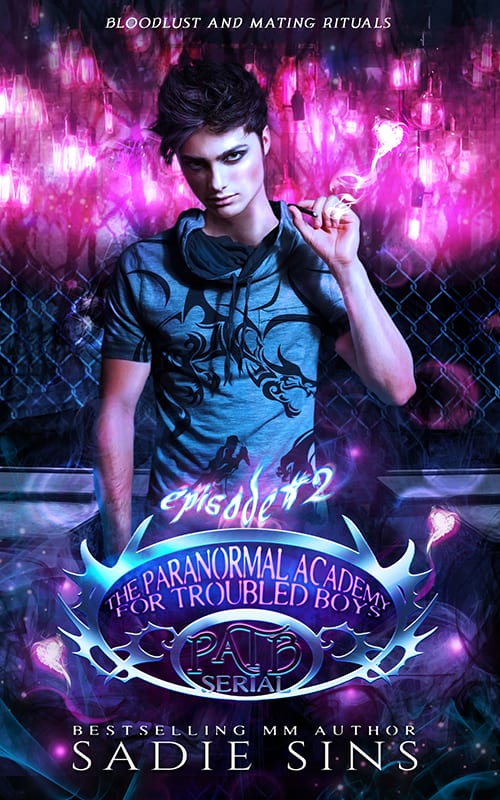

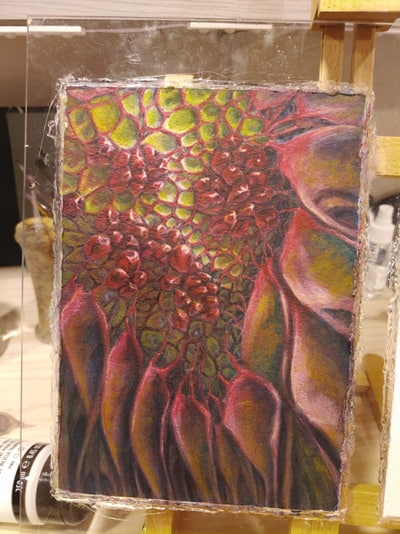
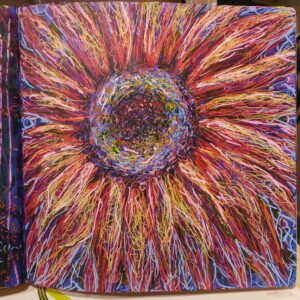
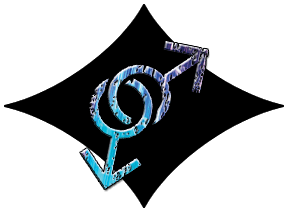 Lamenting A Life Not Lived Is A Fucking Waste
Lamenting A Life Not Lived Is A Fucking Waste